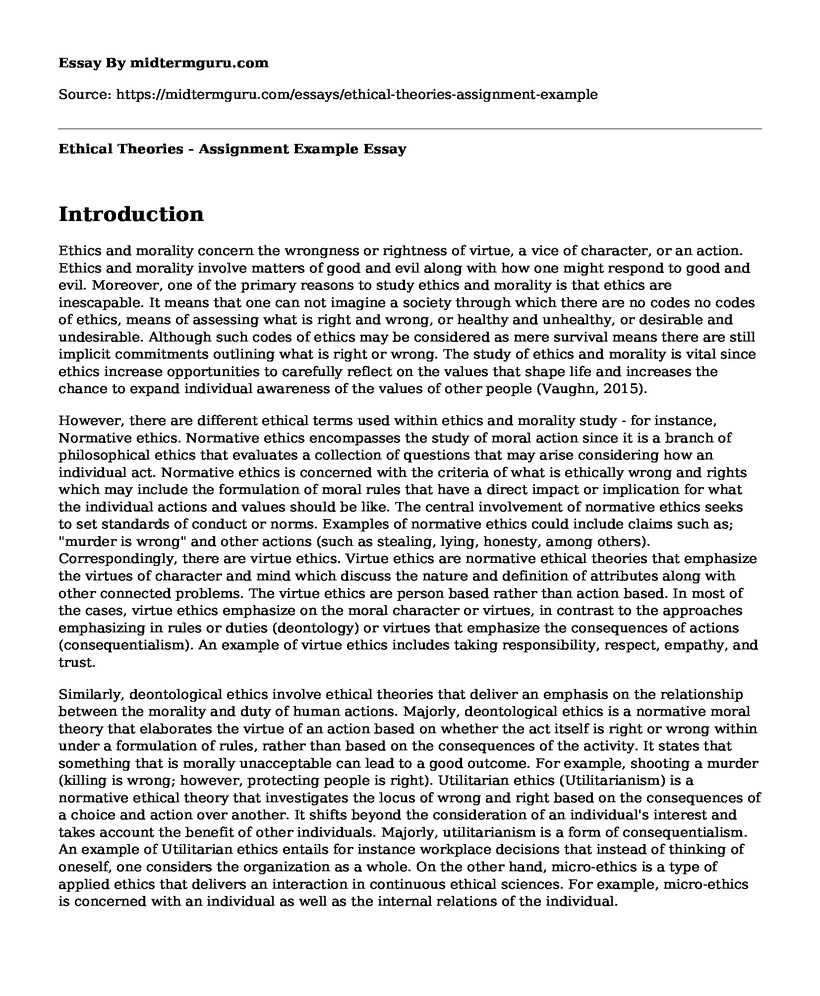Introduction
Ethics and morality concern the wrongness or rightness of virtue, a vice of character, or an action. Ethics and morality involve matters of good and evil along with how one might respond to good and evil. Moreover, one of the primary reasons to study ethics and morality is that ethics are inescapable. It means that one can not imagine a society through which there are no codes no codes of ethics, means of assessing what is right and wrong, or healthy and unhealthy, or desirable and undesirable. Although such codes of ethics may be considered as mere survival means there are still implicit commitments outlining what is right or wrong. The study of ethics and morality is vital since ethics increase opportunities to carefully reflect on the values that shape life and increases the chance to expand individual awareness of the values of other people (Vaughn, 2015).
However, there are different ethical terms used within ethics and morality study - for instance, Normative ethics. Normative ethics encompasses the study of moral action since it is a branch of philosophical ethics that evaluates a collection of questions that may arise considering how an individual act. Normative ethics is concerned with the criteria of what is ethically wrong and rights which may include the formulation of moral rules that have a direct impact or implication for what the individual actions and values should be like. The central involvement of normative ethics seeks to set standards of conduct or norms. Examples of normative ethics could include claims such as; "murder is wrong" and other actions (such as stealing, lying, honesty, among others). Correspondingly, there are virtue ethics. Virtue ethics are normative ethical theories that emphasize the virtues of character and mind which discuss the nature and definition of attributes along with other connected problems. The virtue ethics are person based rather than action based. In most of the cases, virtue ethics emphasize on the moral character or virtues, in contrast to the approaches emphasizing in rules or duties (deontology) or virtues that emphasize the consequences of actions (consequentialism). An example of virtue ethics includes taking responsibility, respect, empathy, and trust.
Similarly, deontological ethics involve ethical theories that deliver an emphasis on the relationship between the morality and duty of human actions. Majorly, deontological ethics is a normative moral theory that elaborates the virtue of an action based on whether the act itself is right or wrong within under a formulation of rules, rather than based on the consequences of the activity. It states that something that is morally unacceptable can lead to a good outcome. For example, shooting a murder (killing is wrong; however, protecting people is right). Utilitarian ethics (Utilitarianism) is a normative ethical theory that investigates the locus of wrong and right based on the consequences of a choice and action over another. It shifts beyond the consideration of an individual's interest and takes account the benefit of other individuals. Majorly, utilitarianism is a form of consequentialism. An example of Utilitarian ethics entails for instance workplace decisions that instead of thinking of oneself, one considers the organization as a whole. On the other hand, micro-ethics is a type of applied ethics that delivers an interaction in continuous ethical sciences. For example, micro-ethics is concerned with an individual as well as the internal relations of the individual.
Conclusion
To sum everything up, we study ethics and morality because it develops individual skills especially in articulating values. For example, the study of virtue ethics is significant since it focuses on the development of the character of an individual especially in handling ethical dilemmas. Similarly, we study deontological ethics to ensure that we can use rules to establish what is right or wrong. Also, we study Utilitarian ethics in morality and ethics since utilitarianism helps promote the right course of action of other individuals by fostering happiness. Today, almost every activity is tied to an ethical practice by helping distinguish between what is moral and unethical or good and bad.
References
Vaughn, L. (2015). Doing ethics: Moral reasoning and contemporary issues. WW Norton & Company.
Cite this page
Ethical Theories - Assignment Example . (2022, Nov 06). Retrieved from https://midtermguru.com/essays/ethical-theories-assignment-example
If you are the original author of this essay and no longer wish to have it published on the midtermguru.com website, please click below to request its removal:
- Prosocial Motives, Emotions and Behavior
- Essay Example on Public Shaming
- Paper Example on Gender Differences in Statistical Anxiety Among South Australian Undergraduate Students
- Paper Example on OCD and OCPD Conditions
- Essay Sample on Stories That Inspire Advocacy
- Essay Sample on Contemporary Body Image
- Man With Rare Medical Condition Goes on Attack, Claiming Government Experimentation - Essay Sample







